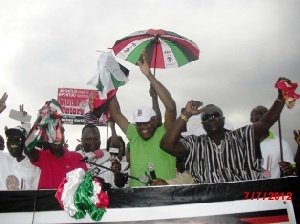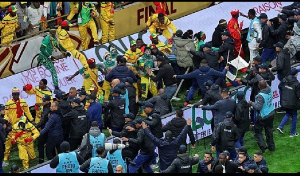S. Kwaku Asare
Is it Time to Impose Campaign Spending Limits and Enforce the Campaign Laws?
How much did President John Mahama and the NDC spend in prosecuting the 2012 general elections? How did they spend their funds? What were the sources of these funds? What are the comparable metrics for Nana Akufo Addo, the NPP, other presidential candidates, political parties and all parliamentary candidates?
According to the Article 55(14), “Political parties shall be required by law (a) to declare to the public their revenues and assets and the sources of those revenues and assets; and (b) to publish to the public annually their audited accounts. Further, the Political Parties Act require all political parties to file with the Electoral Commission (EC) a statement of assets and liabilities (within 21 days before a general election), statement of expenditure (within 6 months after a general or by-election in which the party participates), returns and audited accounts of the political party (within 6 months from December 31st of each year). The Act also stipulates that, “any person may, on payment of a fee determined by the Commission, inspect or obtain copies of the returns and audited accounts of a political party filed with the Commission under this section.” These laws are designed to: (i) control the sources of political funding (for instance, only a citizen of Ghana may make a contribution or donation to a political party); (ii) ensure that the income and spending of political parties and election candidates are transparent (e.g., state resources cannot be commingled with political party resources or used to fund incumbents); and (iii) limit spending on campaigns (so that campaigns become about ideas and not just for the wealthy).
Although Article 55(14) obligates political parties to publicly disclose their audited statements, the political parties have, thus far, failed to comply with the provision. Perhaps, following the Supreme Court, they have adopted a “purposive” interpretation of Article 55(14) and, as we know, such an approach to interpretation has the important magical properties of converting “shall” to “may” and “unable to perform presidential functions” to “travelling outside the country to perform presidential functions.”
As the amounts spent on political campaigns have reached staggering heights and the evidence accumulates that state resources are being diverted to political campaigns, it is time to renew our commitment to Article 55(14) by demanding that political parties, including political candidates, publicly disclose their audited statements of revenue, spending, assets and liabilities within 3 months of general and by-elections.
In the same spirit, the Political Parties Act should be amended to require the EC to publish, on its website, any and all financial statements filed with it. The requirement for individuals to pay a fee to inspect copies of the return is not only inconsistent with the constitutional spirit of public disclosure and scrutiny; it is also cumbersome and favors those who can afford the fee. If political parties are constitutional creatures cum public organizations then their audited financial statements should be available and accessible to the public without a fee.
It is also time for the nation and parliament to have a serious debate on capping campaign spending. In most countries, there are limits on how much a political party and a candidate can spend on campaigning during elections. For instance, in UK, the maximum one can spend as a parliamentary candidate is £32,150 + 10p/14p per elector in a borough/county constituency (broken down into £7,150 + 5p/7p from the day she becomes a candidate for election to polling day + £25,000 + 5p/7p on spending prior to becoming a candidate). Consequently, total spending by all 43 political parties in UK in 2010 was a mere £31,498,745. In these jurisdictions, political parties and candidates must also keep records of their spending, which are independently audited and published online for public scrutiny. Although our campaign spending figures are not publicly available, anecdotal evidence suggests and supports that campaign spending, at all levels, has become excessive and is leading to criminal activities, including vote buying and bribery of election officials. Will anyone be surprised to learn that each of our major political parties spent in excess of £31,498,745 during the last general election? Is it unreasonable to guess that some parliamentary candidates are spending in excess of £250,000 to campaign in constituencies that lack WET (Water, Electricity and Toilet)?
Even more distressing, a substantial portion of the spending is on criminal activities, such as buying votes, bribing election officials or financing hooliganism. Most people now refer to the election year as the cocoa season, when they can extract maximum rent from do-nothing politicians. The effect of the excessive and unproductive campaign spending on the body politic is easy to discern. First, grassroots candidates who lack the financial muscle are outmuscled and frozen out of the political space. Second, politicians see their spending as an investment that must be recouped when they are elected. This is probably the primary driver of political corruption. Third, our elections have become about rent payments rather than ideas. As a result, our perennial problems (lack of WET) are never solved. Fourth, democracy has become a negative net present value project, which produces a lot of motion and heat but no movement or light!
The current campaign financing and spending model is irreparably broken and is not capable of producing leaders who can solve our problems. It must be fixed by the next election cycle. Inter alia, the following issues must be addressed: Parliament must debate and pass a bill that imposes a verifiable limit on campaign spending. Such a law must clearly delineate records that must be kept, reporting periods, audit and public disclosure requirements. The UK model that comprises of a fixed amount of spending plus a variable component to reflect the number of voters in the constituency is worth considering. It is unclear to me why spending by a parliamentary candidate should exceed GH¢100,000 per election cycle.
The Constitution already requires the State to provide fair opportunity to all political parties to present their programs to the public by ensuring equal access to the state-owned media. Although this is an important source of public funding for political parties, the model must be expanded to provide for public town hall meeting at the polling and constituency level to lift some of the burden on parliamentary candidates. It is also time to enforce the criminal aspects of election laws. For instance, consider the offence of treating, which refers to giving, providing or paying wholly or in part for meat, drink, entertainment to corruptly influence another person to vote or refrain from voting. This is a serious offence that attracts, on conviction, a penalty of a fine not exceeding ¢1 million or to a term of imprisonment not exceeding two years or both. When was the last time anyone was accused and prosecuted of treating? Are Presiding Officers prosecuted when they fail to sign pink sheets? It is time to empower election prosecutors to aggressively go after those who violate election laws.
The Constitution attempts to create a level playing field for all Presidential candidates. For instance, Article 55(12) states that, “all presidential candidates shall be given the same amount of time and space on the state-owned media to present their programs to the people.” But over time, we have developed an unsustainable model that allows incumbents to divert state resources to campaign use, to the disadvantage of their opponents. This effect has been achieved primarily by ignoring the constitutional mandates of public disclosure. It is time to halt the subversion of the constitution by demanding compliance with Article 55(14). The Auditor General has also not been proactive in monitoring and reporting on such illegal abuse of incumbency.
Our laws require that foreigners do not interfere in our elections with their donations. However, there is no mechanism for enforcing these laws in the absence of audited public disclosures. Do foreigners donate to political parties and candidates? If so, will this violation be allowed to persist in 2016? Our political campaigns have become too expensive and there is no evidence that they are generating solutions to our problems. Au contraire, the evidence suggests that the expenditures are driven by vote buying and other allied election shenanigans. The Constitution provides clear rules for campaign contributions and disclosures. These rules are meant to assure that campaigns become about ideas and not a contest of who can spend most to buy voters. Over the years, we have ignored these rules to great peril.
The nation, led by parliament, must consider and impose spending limits on campaign spending at the party and candidates’ levels for the next general election. The accountability, disclosure and funding rules mandated by the Constitution and our laws must be strictly enforced in 2016.
Opinions of Monday, 30 September 2013
Columnist: Asare, Kwaku S.















